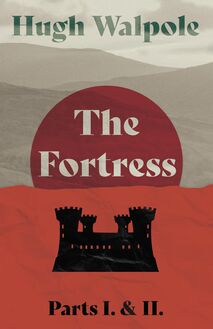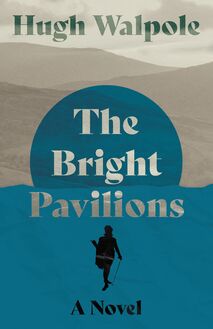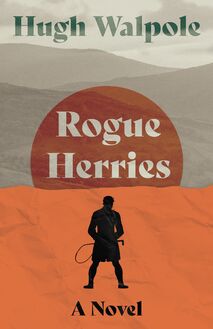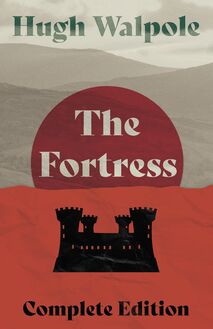-
 Univers
Univers
-
 Ebooks
Ebooks
-
 Livres audio
Livres audio
-
 Presse
Presse
-
 Podcasts
Podcasts
-
 BD
BD
-
 Documents
Documents
-
- Cours
- Révisions
- Ressources pédagogiques
- Sciences de l’éducation
- Manuels scolaires
- Langues
- Travaux de classe
- Annales de BEP
- Etudes supérieures
- Maternelle et primaire
- Fiches de lecture
- Orientation scolaire
- Méthodologie
- Corrigés de devoir
- Annales d’examens et concours
- Annales du bac
- Annales du brevet
- Rapports de stage
La lecture à portée de main
Vous pourrez modifier la taille du texte de cet ouvrage
Découvre YouScribe en t'inscrivant gratuitement
Je m'inscrisDécouvre YouScribe en t'inscrivant gratuitement
Je m'inscrisEn savoir plus
Vous pourrez modifier la taille du texte de cet ouvrage
En savoir plus

Description
Judith Paris returns to the Lake District to settle a family feud in this third volume of Hugh Walpole’s, The Herries Chronicle.
Now middle-aged, Judith must return to her countryside home to help resolve a dispute between two branches of her family. Grandeur, drama, and violence have always been at the focal point of the Herries family. First published in 1932, this third instalment of the saga tells the story of the marvellous family house, The Fortress.
Proudly republished by Read & Co. Books, The Fortress is a great addition to the bookshelves of historical fiction readers.
Sujets
Informations
| Publié par | Read Books Ltd. |
| Date de parution | 08 juin 2015 |
| Nombre de lectures | 0 |
| EAN13 | 9781473375734 |
| Langue | English |
| Poids de l'ouvrage | 1 Mo |
Informations légales : prix de location à la page 0,0500€. Cette information est donnée uniquement à titre indicatif conformément à la législation en vigueur.
Extrait
THE FORTRESS
PARTS I. & II.
By
HUGH WALPOLE
First published in 1932
Copyright © 2022 Read & Co. Classics
This edition is published by Read & Co. Classics, an imprint of Read & Co.
This book is copyright and may not be reproduced or copied in any way without the express permission of the publisher in writing.
British Library Cataloguing-in-Publication Data A catalogue record for this book is available from the British Library.
Read & Co. is part of Read Books Ltd. For more information visit www.readandcobooks.co.uk
FOR MY FRIENDS GERTRUDE AND MUIRHEAD BONE
Contents
Hugh Walpole
PART I
MADAME
THE SHADOW AGA INST THE SKY
AT WESTAWAYS
ADAM’S WORLD
THE SUMMER FAIR
THE BEGINNING OF THE FORTRESS
JUDITH AND AD AM IN LONDON
WESTAWAYS: FA THER AND SON
ENTRY OF THE FORTRESS
PART II
ADAM AND MARGARET
THE BATTLE
T HE CHARTISTS
HISTORY OF ELIZABETH
T HE GOVERNESS
FA MILY LETTERS
HOMECOMI NG IN WINTER
TH E WILD GOOSE
Hugh Walpole
Hugh Seymour Walpole was born in Auckland, New Zealand in 1884. He was educated at a series of boarding schools in England, followed by Emmanuel College, Cambridge. Walpole’s father hoped he would follow him into the clergy, but after three years as a missionary, in 1909, Walpole resolved to become a man of letters. His first commercial success came in 1911 with the novel Mr Perrin and Mr. Traill , after which Walpole made the acquaintance of writers such as Henry James and Joseph Conrad, and declared his ambition to become the greatest writer of his era. For the rest of his life, Walpole wrote prolifically. During the twenties he produced more than a novel a year, with The Cathedral (1922) and Wintersmoon (1928) proving to be great successes. In 1930, he began his most popular series of novels with the historical romance Rogue Herries , following it with Judith Paris (1931), The Fortress (1932) and Vanessa (1933). Eventually, he amassed an oeuvre of 36 novels, five volumes of short stories, two plays and three volumes of memoirs. He died in 1941, aged 57. Despite the fact that Walpole sold enormously well on both sides of the Atlantic, and was praised by many of his contemporaries, he is somewhat forgotten now, in part because he was overshadowed by P. G. Wodehouse and others.
Th y gentlest dreams, thy frailest,
Even those that were
Born and lost in a heart-beat,
Shall meet thee there.
They are become immortal
In shining air.
The unattainable beauty,
The though t of which was pain,
That flickered in eyes and on lips
And vanished again;
That fugitive beauty
Thou shalt attain.
Those lights innumerable
That led thee on and on,
The masque of time ended,
Shall glow into one.
They shall be with thee for ever,
Thy travel done.
A. E.
P ART I
MADAME
TH E SHADOW AGAINST THE SKY
‘All is well,’ Judith said quietly, coming forward and stroking the red apples of the sofa. ‘I shall not leave you, Jennifer. It is bette r I remain.’
As her hand mechanically stroked those same rosy apples, so friendly and familiar, sh e reflected.
Yes, this simple sentence declared the crisis of her whole existence. Nothing ever again could matter to her so deeply as this decision. With it she had cut away half her life, and perhaps the better half. She was not by nature a dramatic woman; moreover, she had but lately returned from the funeral of the best friend she had, and she was forty-seven years of age in this month of January 1822. So—for women then thought forty-seven a vast age—she should be past drama. Quietly she sat down on the sofa, leaned forward, looking into the fire. Jennifer Herries was speaking with eager excitement, but Judith did not hear her. Jennifer was fifty-two and should also be past drama but, although a lazy woman, she liked sensation when it did not put herself to discomfort.
Judith at that moment heard and saw nothing but the past, the past that she was irrevocably forsaking. Strange how the same patterns were for ever returning! Her father had been a rogue and a vagabond, a rebel against all the order and material discipline of the proper Herries. In his early years he had married Convention and of her had had a son, late in life he had married a gipsy and of her had had a daughter in his old age, when he was over seventy. David at one end of his life, Judith a t the other.
In their histories again the pattern had been repeated. David of his marriage had had two sons: Will the money-maker, Francis the dreamer. Will prospered even now in the City; Francis was a failure, dead of h is own hand.
And with their children again the pattern was repeated. For Will’s son Walter was triumphant near by in his house at Westaways, and Francis’ widow, Jennifer, and Francis’ children, John and Dorothy, remained, undefended, her e at Uldale.
It was here that she, Judith, came into the pattern. Daughter of two vagabonds, mother of an illegitimate boy, she should be vagrant. Half of her—the finer, truer, more happy and fortunate half—(she nodded at the fire in confirmation) was so. But the other half was proper, managing, material, straight-seeing Herries. She threw her wild half into the blaze (her hand flickered towards the fire). It was gone. She remained to fight for Jennifer, Jennifer’s children, John and Dorothy, and, maybe, who knows? . . . her o wn boy Adam.
To fight whom? Here Jennifer’s voice br oke through:
‘. . . That will be most agreeable. I have always said that the Yellow Room needs but a trifle alter ing and it will make . . . but Francis would never see it. And with a new wallpaper . . . We must certainly have a new wallp aper . . . ’
To fight Walter Herries, and all that were his. As ‘Rogue’ Herries in his tumble-down house in Borrowdale had fought all the world, as Francis his grandson had tried to fight the world and failed, so now would she fight Walter, flamboyant, triumphing Walter, made of Will and his money-bags, sworn to extinguish Jennifer and her children and all that were in Fell Ho use, Uldale.
It had been the wish of her whole life to flee from all the Herries and live in the hills as her mother had lived before her, but Walter Herries had challenged her and she had taken up th e challenge.
‘. . . Not that it should be difficult,’ Jennifer was saying, ‘to find another girl to work with Doris. Girls will come willingly enough now that you are going to remain, Judith, dear . . . ’
Walter and his two children, Uhland and Elizabeth, with all the money in the world, against Jennifer and her children, undefended and helpless, Judith and her Adam, fatherless and by law without a name . . .
Jennifer was going on: ‘And Walter will not dare , now that you are remaining, Judith . . . You are the only one of us all of whom he is afraid . . . He will not dare . . . ’
Would he not, so large and confident and powerful? Had he not said that he would snuff them out—Jennifer, John, Dorothy—raze Fell House to the ground? And what had she , small, elderly, alone, with no one in the world belonging to her save Adam, to oppose to th at strength?
Nevertheless, she looked across to Jennifer t riumphantly.
‘We will give Walter something to think about ,’ she said.
‘And you can go to Watendlath when you wish,’ Je nnifer said.
‘Oh no. Watendlath is over for me. Watendlath is ended, a clo sed valley.’
‘But how foolish, Judith. It is only a m ile or two.’
‘It is the other end of the world.’
* * * * *
She did not tell anyone how that night, with Adam asleep beside her, she cried. She lay awake for half the night, hearing the owl hoot, a mouse scuttle, and seeing a slow, lonely moon trace with her silver finger a question mark acros s the floor.
Her thoughts were wild, incoherent, most mingled. At one moment she was fiercely rebellious. She sat up, staring about her. No, she would not remain! She would tell Jennifer in the morning that she revoked her decision. She allowed her fancy then to play with the lovely sequence of events if she went. Tom Ritson should arrive in his cart. She and Adam would be packed into it, and, after tearful farewells, they would be off, down the hill with one last backward wave at the bottle-green windows of the Uldale shop and the slow friendly shoulder of the moor, along the road to Bassenthwaite, b eside the Lake, Keswick, then up the hill again, above Lodore, and then—— Oh, happiness! Oh, joy! The little valley closing them in, the long green field, the tumbling Punchbowl, the two farms, her own, John Green House, and the Ritsons’; below the farm the round scoop of the Tarn, black or silver or blue, the amphitheatre of the hills, the sheep nosing at the turf, the cattle moving in the byre, and best of all, Charlie Watson, straight as an arrow in spite of his years, riding towards her over the stones . . . the fresh sweet air, tang of soil and bracken, glitter of stones, sweep of the changing sky . . . she had to catch the sheets betwee n her hands.
That life was for ever surrendered. Then, at once, her other practical self came running in. She was mistress of Fell House now. They would all do anything that she told them. Jennifer was her slave. She had seen, at the Ireby funeral, what the neighbours and villagers thought of her. Yes, in spite of her illegitimate son. Many things would have to be done. Had she strength enough? It was the convention that a woman over forty was an ‘old thing’ without savour. It was true that she had been aware, for some time past, of the troubles, melancholies, miasmas peculiar to her time of life, but she had refused to surrender to them. She felt within her a wonderful vitality and energy, as though she were at the beginning of life rather t
-
 Univers
Univers
-
 Ebooks
Ebooks
-
 Livres audio
Livres audio
-
 Presse
Presse
-
 Podcasts
Podcasts
-
 BD
BD
-
 Documents
Documents
-
Jeunesse
-
Littérature
-
Ressources professionnelles
-
Santé et bien-être
-
Savoirs
-
Education
-
Loisirs et hobbies
-
Art, musique et cinéma
-
Actualité et débat de société
-
Jeunesse
-
Littérature
-
Ressources professionnelles
-
Santé et bien-être
-
Savoirs
-
Education
-
Loisirs et hobbies
-
Art, musique et cinéma
-
Actualité et débat de société
-
Actualités
-
Lifestyle
-
Presse jeunesse
-
Presse professionnelle
-
Pratique
-
Presse sportive
-
Presse internationale
-
Culture & Médias
-
Action et Aventures
-
Science-fiction et Fantasy
-
Société
-
Jeunesse
-
Littérature
-
Ressources professionnelles
-
Santé et bien-être
-
Savoirs
-
Education
-
Loisirs et hobbies
-
Art, musique et cinéma
-
Actualité et débat de société
- Cours
- Révisions
- Ressources pédagogiques
- Sciences de l’éducation
- Manuels scolaires
- Langues
- Travaux de classe
- Annales de BEP
- Etudes supérieures
- Maternelle et primaire
- Fiches de lecture
- Orientation scolaire
- Méthodologie
- Corrigés de devoir
- Annales d’examens et concours
- Annales du bac
- Annales du brevet
- Rapports de stage














